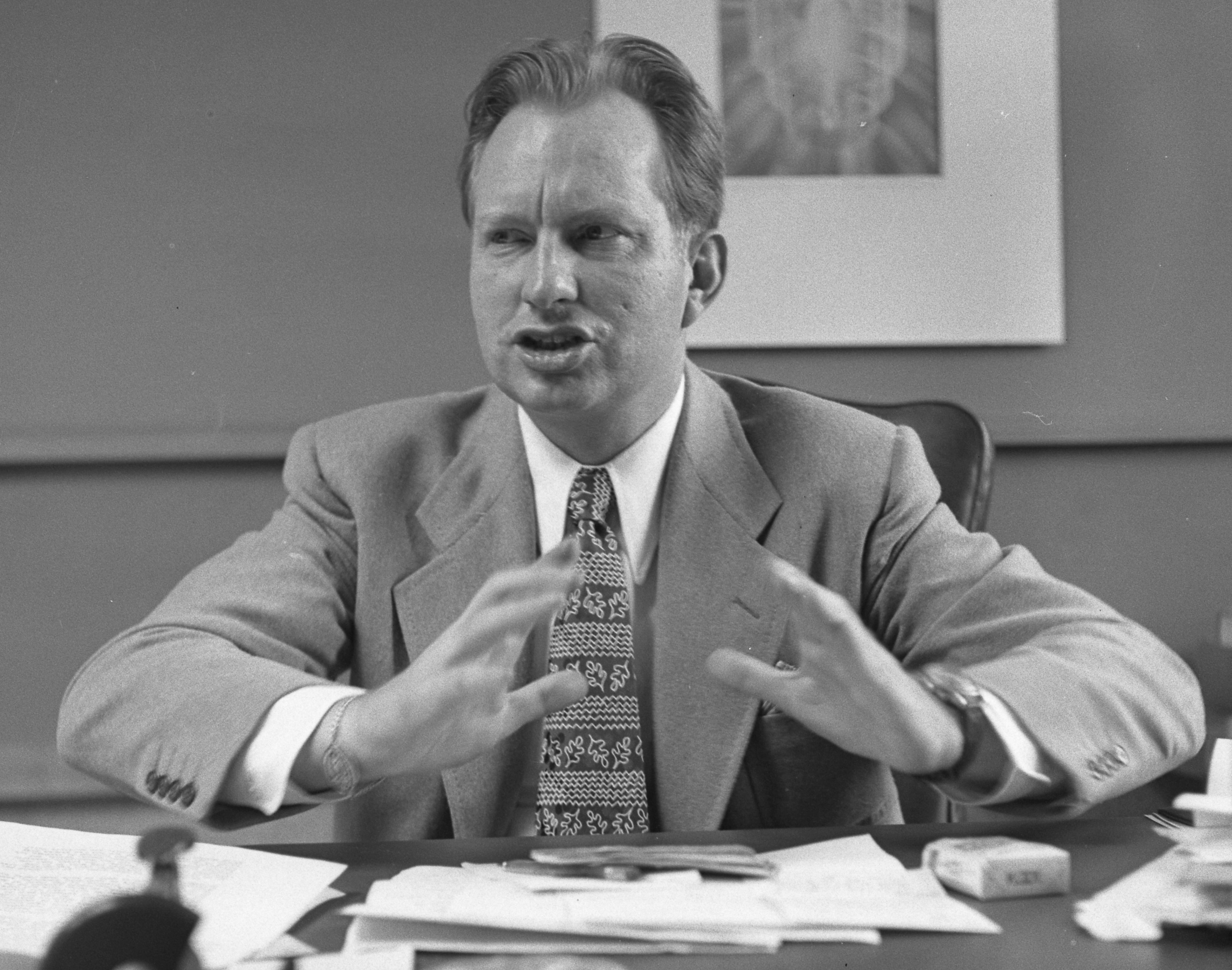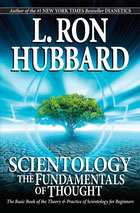“Se si può vedere una cosa la si può avere, se si crede di poterla avere.”
Origine: Scientology: I Fondamenti del Pensiero, p. 28
Lafayette Ronald Hubbard, generalmente noto con il nome di L. Ron Hubbard è stato uno scrittore statunitense, noto per essere stato il fondatore di Scientology.
Sul finire degli anni trenta divenne noto come scrittore di fantascienza e fantasy nell'epoca d'oro della fantascienza. Nel 1950 con la pubblicazione di Dianetics: la forza del pensiero sul corpo inizia a elaborare lo sviluppo di Scientology. Sin dalla prima fondazione di Dianetics, Hubbard sostenne di condurre un percorso di ricerca spirituale arrivando a redigere centinaia di scritti e tenere circa 3.000 conferenze sui vari temi dell'indagine. Parallelamente negli anni sviluppa un sistema di management per l'organizzazione di Scientology e sul management generale. Ritorna poi alla narrativa negli anni ottanta con i best seller Battaglia per la Terra e i dieci libri della serie Missione Terra.
Hubbard è stato una figura controversa e numerosi dettagli della sua vita sono oggetto di dibattito. L'organizzazione di Scientology presenta il personaggio di Hubbard e la sua personalità come assai sfaccettata e in una luce di esaltazione, creando "una sorta di agiografia, una narrativa idealizzata costruita attorno a tematiche mitiche". Altre biografie di Hubbard scritte da giornalisti indipendenti ne dipingono invece un quadro più fosco e in molti casi contraddicono il materiale presentato dall'organizzazione di Scientology. Nel 2012 l'organizzazione di Scientology ha pubblicato una biografia ufficiale in 16 volumi di oltre 3.000 pagine.La rivista Smithsonian lo ha incluso nei 100 americani più influenti di tutti i tempi. Il nome "L. Ron Hubbard" è un marchio registrato di proprietà del Religious Technology Center. Hubbard ha pubblicato 1084 opere scritte, primato mondiale per il maggior numero di opere pubblicate.
Wikipedia

“Se si può vedere una cosa la si può avere, se si crede di poterla avere.”
Origine: Scientology: I Fondamenti del Pensiero, p. 28
“L' autodeterminazione è la condizione di decidere la proprie azioni.”
Origine: Scientology: I Fondamenti del Pensiero, p. 48
“Il cambiamento è la manifestazione primaria del tempo.”
Origine: Scientology: I Fondamenti del Pensiero, p. 72
“Il miglior modo per comprendere la vita è di paragonarla a un gioco.”
Origine: Scientology: I Fondamenti del Pensiero, ISBN 9781403145895, p. 53
“Mentire è il livello più basso di creatività.”
Origine: Scientology: I Fondamenti del Pensiero, p. 20
“Per godere la vita si deve essere disposti a farne, in una certa misura, parte.”
Origine: Scientology: I Fondamenti del Pensiero, p. 44
Origine: L. Ron Hubbard, Filosofo e fondatore, la riscoperta dell’anima umana, ISBN 9788764936810, p. 62
“Ciò che creiamo nelle nostre società in questa vita influenzerà la nostra vita successiva.”
Origine: L. Ron Hubbard, Filosofo e fondatore, la riscoperta dell’anima umana, ISBN 9788764936810, p. 102
“Possedere vuol dire essere capaci di vedere, toccare o occupare.”
Origine: Scientology: I Fondamenti del Pensiero, p. 29
Origine: L. Ron Hubbard, Filosofo e fondatore, la riscoperta dell’anima umana, ISBN 9788764936810, p. 22
Origine: L. Ron Hubbard, Filosofo e fondatore, la riscoperta dell’anima umana, ISBN 9788764936810, p. 23
“Lo spirito è la sorgente di tutto. Tu sei uno spirito.”
Origine: L. Ron Hubbard, Filosofo e fondatore, la riscoperta dell’anima umana, ISBN 9788764936810, p. 51
Origine: L. Ron Hubbard, Filosofo e fondatore, la riscoperta dell’anima umana, ISBN 9788764936810, p. 60
Origine: L. Ron Hubbard, Filosofo e fondatore, la riscoperta dell’anima umana, ISBN 9788764936810, p. 91
Origine: L. Ron Hubbard, Filosofo e fondatore, la riscoperta dell’anima umana, ISBN 9788764936810, p. 25
Dianetics And Scientology Technical Dictionary (1975); 1987 edition, p. 370.
“You don't get rich writing science fiction. If you want to get rich, you start a religion.”
Response to a question from the audience during a meeting of the Eastern Science Fiction Association on (7 November 1948), as quoted in a 1994 affidavit by Sam Moskowitz.
This statement is similar or identical to several statements http://www.bible.ca/scientology-1million-start-a-religion.htm Hubbard is reported to have made to various individuals or groups in the 1940s. Variants include:
The incident is stamped indelibly in my mind because of one statement that Ron Hubbard made. What led him to say what he did I can't recall — but in so many words Hubbard said: "I'd like to start a religion. That's where the money is!"
L. Ron Hubbard to Lloyd A. Eshbach, in 1949; as quoted by Eshbach in his autobiography Over My Shoulder: Reflections On A Science Fiction Era (1983) ISBN 1-880418-11-8 .
Y'know, we're all wasting our time writing this hack science fiction! You wanta make real money, you gotta start a religion!
As reported to Mike Jittlov by Theodore Sturgeon as a statement Hubbard made while at the Los Angeles Science Fantasy Society clubhouse in the 1940s.
Writing for a penny a word is ridiculous. If a man really wanted to make a million dollars, the best way to do it would be start his own religion.
As quoted in the Los Angeles Times (27 August 1978)
Writing for a penny a word is ridiculous. If a man really wants to make a million dollars, the best way would be to start his own religion.
As quoted in the article "Scientology: Anatomy of a Frightening Cult" by Eugene H. Methvin. Reader's Digest (May 1980).
I always knew he was exceedingly anxious to hit big money — he used to say he thought the best way to do it would be to start a cult.
Sam Merwin, Editor of Thrilling Science Fiction magazine Winter of 1946-47; quoted in Bare-Faced Messiah, The True Story of L. Ron Hubbard (1987) by Russell Miller
Whenever he was talking about being hard up he often used to say that he thought the easiest way to make money would be to start a religion.
Neison Himmel, briefly a roommate of Hubbard in Pasadena during the fall of 1945, in a 1986 interview, quoted in Bare-Faced Messiah, The True Story of L. Ron Hubbard (1987) by Russell Miller.
Lecture: "Off the Time Track" (June 1952) as quoted in Journal of Scientology issue 18-G, reprinted in Technical Volumes of Dianetics & Scientology Vol. 1, p. 418.
“Oh yes! The one man in the world who never believes he's mad is the madman.”
In answer to the question as to whether he ever thought he might be quite mad. Granada Television documentary on Scientology http://www.youtube.com/watch?v=L_w-YWwC1lI#t=1503.
“Ideas and not battles mark the forward progress of mankind.”
Science of Survival (1951)
Contesto: Ideas and not battles mark the forward progress of mankind. Individuals, and not masses, form the culture of the race.
A letter to his wife Polly (October 1938) http://bernie.cncfamily.com/sc/excalibur.htm, quoted in Bare-faced Messiah: The True Story of L. Ron Hubbard (1987), p. 81 http://www.discord.org/~lippard/bfm/bfm05.htm#81.
Contesto: Living is a pretty grim joke, but a joke just the same. The entire function of man is to survive. The outermost limit of endeavour is creative work. Anything less is too close to simple survival until death happens along. So I am engaged in striving to maintain equilibrium sufficient to at least realize survival in a way to astound the gods. I turned the thing up so it's up to me to survive in a big way... Foolishly perhaps, but determined none the less, I have high hopes of smashing my name into history so violently that it will take a legendary form even if all books are destroyed.
All we know of science or of religion comes from philosophy. It lies behind and above all other knowledge we have or use.
My Philosophy (1965) http://www.foundingchurchdc.org/dc/ref/philo/index.htm.
“Living is a pretty grim joke, but a joke just the same.”
A letter to his wife Polly (October 1938) http://bernie.cncfamily.com/sc/excalibur.htm, quoted in Bare-faced Messiah: The True Story of L. Ron Hubbard (1987), p. 81 http://www.discord.org/~lippard/bfm/bfm05.htm#81.
Contesto: Living is a pretty grim joke, but a joke just the same. The entire function of man is to survive. The outermost limit of endeavour is creative work. Anything less is too close to simple survival until death happens along. So I am engaged in striving to maintain equilibrium sufficient to at least realize survival in a way to astound the gods. I turned the thing up so it's up to me to survive in a big way... Foolishly perhaps, but determined none the less, I have high hopes of smashing my name into history so violently that it will take a legendary form even if all books are destroyed.
“Here on Earth there was undoubtedly a Christ.”
One of the reasons he swept in so suddenly and he would go forward so hard is, he had a good assist in back of him in terms of an implant.
Philadelphia Doctorate Courses, lecture 24 (1952).
"Assists" lecture, #10 in the confidential Class VIII series of lectures (3 October 1968).
A New Slant on Life (1998).
"Propaganda by Redefinition of Words" (5 October 1971).
Scientology Policy Letters
Dept. of Govt. Affairs (15 August 1960).
Scientology Policy Letters
1987 Edition, p. 72.
Dianetics : The Modern Science of Mental Health (1950)
“A culture is only as great as its dreams, and its dreams are dreamed by artists.”
Science of Survival (1951)
My Philosophy (1965) http://www.ronthephilosopher.org/phlspher/page84.htm.
“Never regret yesterday. Life is in you today, and you make your tomorrow.”
The Creation Of Human Ability (1954).
"Times Must Change" in Ability # 179 (20 March 1966) http://www.able.org/about/l-ron-hubbard/articles/times-must-change.php.
The "Tone Scale" is Scientology's measure of mental and spiritual health; p. 145.
Science of Survival (1951)
"Keeping Scientology Working" (7 February 1965).
Scientology Policy Letters
Confidential memo "Project Psychiatry" (22 February 1966).
“Man," said Terl, "is an endangered species.”
Battlefield Earth (1982) Ch 1.

